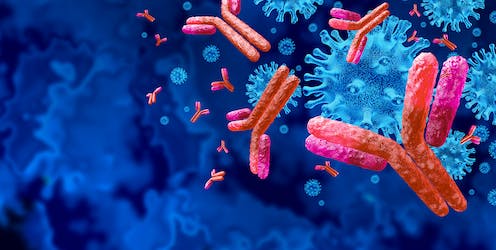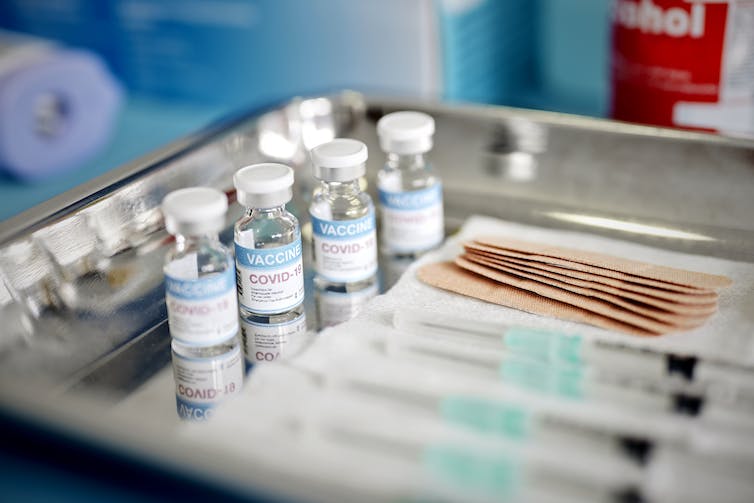
By almost any measure, the vaccination campaign against SARS-CoV-2, the virus that causes COVID-19, has been a global success.
As of January 2023, more than 12 billion vaccines against SARS-CoV-2 have been administered in an effort that has saved countless lives – more than 14 million in the first year of vaccine availability alone. With a 95% efficacy in the prevention of severe infection and death, and better safety profiles than similar historically effective vaccines, the biomedical community hoped that a combination of vaccination and natural immunity might bring the pandemic to a relatively quick end.
But the emergence of new viral variants, particularly omicron and its array of subvariants, upended those expectations. The latest omicron strain, XBB.1.5. – dubbed “Kraken”, after a mythical sea creature – has rapidly become the dominant subvariant in the U.S. The World Health Organization is calling it the most contagious strain so far, with its success almost certainly attributable to an ability to dodge immunity from previous vaccines or infections.
The effort to get ahead of these ever-changing variants is also in part what has led the Food and Drug Administration to reconsider its approach to COVID-19 vaccination. On Jan. 23, 2023, the agency proposed that current guidelines for a series of shots followed by a booster be replaced by an annual COVID-19 vaccine that is updated each year to combat current strains. The proposal is set to be reviewed by the FDA’s science advisory committee on Jan. 26.
Table of Contents
Limitations of current mRNA vaccination strategies
Unfortunately, the new bivalent shots, which include components from both the original SARS-CoV-2 strain as well as a recent omicron variant, have not performed as well as some scientists had hoped. Although there is no question that the updated jabs are capable of boosting antibody levels against SARS-CoV-2 and helping to prevent severe illness and hospitalization, several studies have suggested that they are not necessarily more capable of preventing omicron infections than their predecessors.
As an immunologist who studies how the immune system selects which antibodies to produce and immune responses to COVID-19, these new results are disappointing. But they are not entirely unexpected.
When COVID-19 vaccines were being rolled out in early 2021, immunologists began having public discussions about the potential obstacles to rapidly generating updated vaccines to emerging viral strains. At the time, there was no hard data. But researchers have known for a very long time that immunological memory, the very thing that offers continued protection against a virus long after vaccination, can sometimes negatively interfere with the development of slightly updated immune responses.
The failure of these new bivalent vaccines in widely preventing omicron infections suggests that our current approach is simply not sufficient to interrupt the viral transmission cycle driving the COVID-19 pandemic. In my view, it’s clear that innovative vaccine designs capable of producing a broader immunity are badly needed.
Vaccines are designed to generate immune memory
In simplest terms, vaccines are a way to give your immune system a sneak peek at a pathogen. There are several different ways to do this. One way is to inject inactivated versions of a virus, as has been done with polio. Another is to use noninfectious viral components, such as the proteins used for flu vaccines.
And most recently, scientists have found ways to deliver mRNA “instructions” that tell your body how to make those noninfectious viral components. This is the approach used with the Moderna and Pfizer vaccines targeted against COVID-19.
The mRNA-based vaccines all train your immune system to identify and respond against critical components of a potential invader. An important part of that response is to get your body to produce antibodies that will hopefully prevent future infections, helping to break the cycle of person-to-person transmission.
In a successful response, the immune system will not only produce antibodies that are specific to the pathogen, but will also remember how to make them in case you encounter that same pathogen again in the future.

Morsa Images/DigitalVision via Getty Images
The specter of ‘original antigenic sin’
But what happens when the virus evolves and that memory becomes obsolete?
Immunologists have wondered this since the initial COVID-19 vaccine rollout. Recently, it has found new relevance in light of the FDA’s proposal for an updated annual COVID-19 shot.
While it is possible that immune responses to updated vaccines will simply replace the old ones, that has not been true for influenza. With flu, researchers have learned that preexisting immunity to one strain can actively inhibit the ability to respond well against another.
Put in everyday language, think of a virus as a car trying to run you over. You might produce one kind of antibody against the hood, one against the bumper and one against the hubcaps that prevents the wheels from turning. You have produced three kinds of antibodies specific to the car, but it turns out that only the hubcap antibodies effectively slow it down.
Now the car mutates, like SARS-CoV-2 has. It changes the shape of the hubcaps or it removes them altogether. Your immune system still recognizes the car, but not the hubcaps. The system doesn’t know that the hubcap was the only effective target, so it ignores the hubcaps and ramps up its attack on the hood and bumper.
In ignoring the new hubcap response, the immune system’s memory of the original car is not only obsolete, but it is also actively interfering with the response necessary to target the new car’s wheels. This is what immunologists call “original antigenic sin” – ineffective immune memory that hampers desired responses to new pathogen strains.
This sort of interference has been extremely difficult to quantify and study in humans, although it may become easier with the FDA’s proposal. A once-yearly approach to COVID-19 vaccination opens the door for more straightforward studies on how memory to each vaccine influences the next.
Multi-strain vaccinations offer hope
Simultaneously, significant efforts are being made to prioritize the pursuit of a single-shot or “universal” vaccine. One approach has been to take advantage of emerging research showing that if your immune system is presented with multiple versions of the same pathogen, it will tend to choose targets that are shared between them.
Presented with a Model T, Ford F-150 and electric Mustang all at once, your immune system will often choose to ignore differences like the hubcaps in favor of similarities like the shape and rubber on the tires. Not only would this interfere with the function of all three vehicles, but it could theoretically interfere with most road-based vehicles – or viral threats such as variants.
Researchers have begun making rapid headway using this approach with the development of complex multi-strain flu vaccines that are performing well in early clinical trials. New studies focused on SARS-CoV-2 hope to do the same. Persistent pathogens including influenza and HIV all suffer from versions of the same antibody-targeting issues. It is possible that this pandemic may serve as a crucible of innovation that leads to the next generation of infectious disease prevention.
This is an updated version of an article originally published on March 8, 2021.
![]()
Matthew Woodruff does not work for, consult, own shares in or receive funding from any company or organisation that would benefit from this article, and has disclosed no relevant affiliations beyond their academic appointment.
























